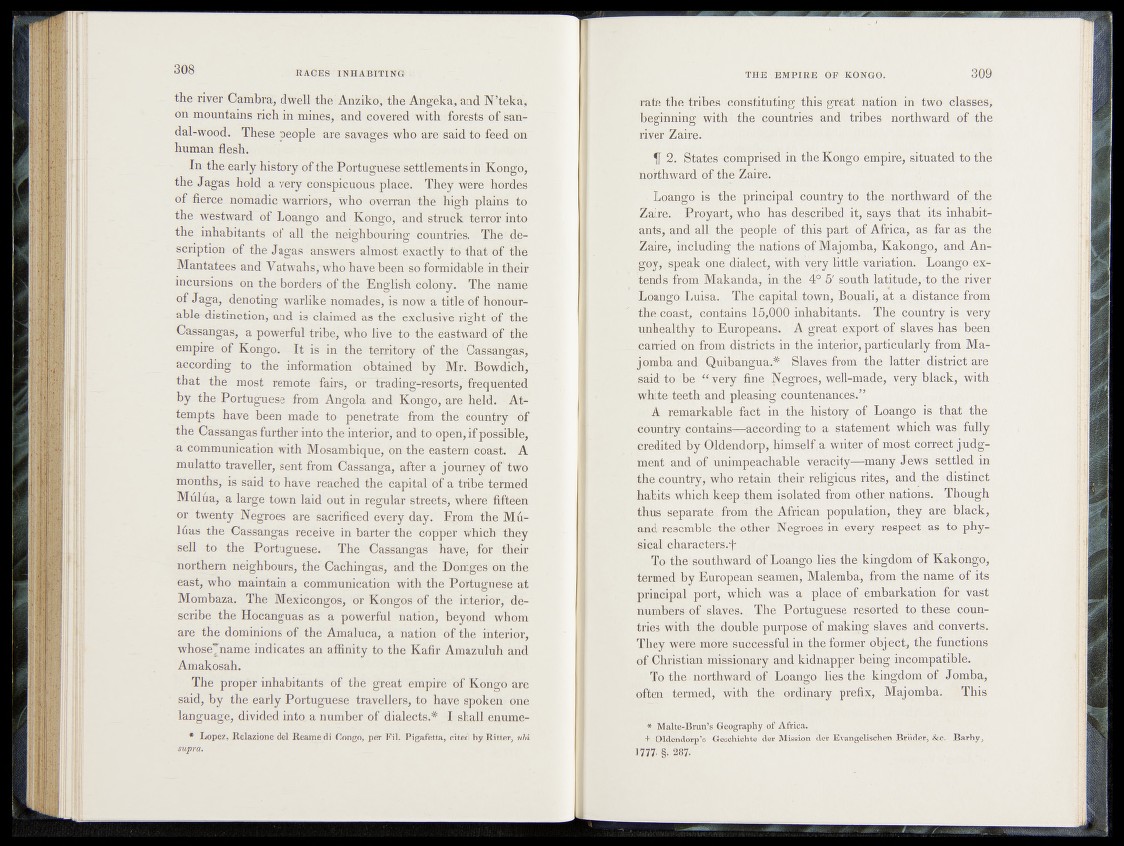
the river Cambra, dwell the Anziko, the Angeka, and N’teka,
cm mountains rich in mines, and covered with forests of sandal
wood. These people are savages who are said to feed on
human flesh.
In the early history of the Portuguese settlements in Kongo,
the Jagas hold a very conspicuous plaee. They Were hordes
of fierce nomadic warriors, who overran the high plains to
the westward of Loango and Kongo, and struck terror into
the inhabitants of all the neighbouring countries. The' description
of the Jagas answers almost exactly to that of the
Mantatees and Vatwahs/who have been so formidable in their
incursions on the borders of the English colony. The nancie
of Jaga, denoting warlike nomades* is now a title of honourable
distinction, and is claimed as the exclusive right bf the
Cassangas, a powerful tribe, who live to the eastward of the
empire of Kongo. It is in the territory of the • Cassangas,
according to the information obtained by Mr. Bowdich,
that the most remote fairs, Orj|trading-resorts, frequented
by the Portuguese from Angola and Kongo, are held. Attempts
have been made to penetrate from the côùntrÿ Of
the Cassangas further into the interior, and to open, if pos sible,
a communication with Mosambique, on the eastern^coast. A
mulatto traveller, sent from Cassanga, after a journey of 'two
months, is said to have reached the capital of a tribe termed
Mulua, a large town laid out in regular streets, where fifteen
or twenty Negroes are sacrificed every day. Prom the Mû*-
Mas the Cassangas receive in barter the copper which they
sell to the Portuguese. The Cassangas have, for their
northern neighbours, the Cachingas, and the Domgés on the
east, who maintain a communication with the Portuguese at
Mombaza. The Mexicongos, or Kongos of the interior, describe
the Hoeanguas as a powerful nation, beyond whom
are the dominions of the Amaluca, a nation of the interior,
whose jiame indicates an affinity to the Kafir Amazuluh and
Amakosah.
The propèr inhabitants of the great empire of Kongo are
said, by the early Portuguese travellers, to have spoken one
language, divided into, a number of dialects.* I shall enume-
* Lopez, Relazione del Reame di Congo, per Fil. Pigafetta, cited by Ritter, ubi
supra.
rate the tribes constituting this great nation in two classes,
beginning with- the countries and tribes 'northward of the
river Zaire.'
• f 2. States-comprised in the Kongo empire, situated to tfr§
ftorthward;'^»jhe Zaire.
• Loango i,s the principal Country to t|ij%, northward of the
Zaire. * Proyart, who. has. described, it, saggp that';.^'inhabitants.,,
and all the''people^it this part of Africa, as faras: thp
Zaire, including the nations of Maj|omha, Kakongo, ;and An-
gey,- speak one dialect,, with, v$ryJiftJe|.yaviation. Loango px-
tends from Mta^anda, in the ^j&Sfi®th latitude,jto the rifcr
Loango Luisa., The capital taWn,. 1 loualLmt^a distai^e from
the <cqag^ c on tain s^fd;l|0Q.; inhabitants.. t The cpmitry^i s , very
unhealthy to Europeans. * - A,-- gr^qtj c xp or t , p F h a s been
.carried on from districts in the interior,particularLy, from.Ma-
^pmba and/Quibangua.* Slaspesffrom „thi^latt^; district are
.said to be “ very fine N b l a c k . with
white teeth and pleasing countenances/’
A remarkable fact in, the history, of Loango ^ t h a t the
country contains—according,to,* a. statement ^hie&\^^|'fully
credited by Oldendorp, himself,a writer1 of mosLi^eef ju flH
naent.and of unimpeachable,, vpraeity—many Jo v ^ ^ e t^ d .in
the country, who retain their religiqus.^fe^ and,the'distipct
habits which, keep them isolated .from other, natiosns. ,, Though
thus separate. from, the African population/^thjprf ate.^lack,
and resemble the other Negroes in .every rcspect^as, to phjj-j
sical characters.'!. . ;
To the southward of Loango. lies the-kingdom of Kakoiagp,
termed by European seamen, Malemba, from^the name, of its
principal port, which was, a plgpe of embarkation, for* vast
numbers of slaves.. The Portuguese,|es^ted^^th^f countries
with the double purpose of making; §l%yes arfd ej$s.
They were more {successful in the former <^j,e(|t^ the functions
of Christian missionary and kidnapper fieihg. incompatible.
To the. northward of. Loango, lies. the ■ kingdom of Jomba,
often termed,;'-with' the, ordinary prefix, Majqmi||d^ This
* Malte-Brun’s Geography of Africa.,
+ Oldendorp’s Geschichte der Mission der Evangelischen Brüder, &c. Barby,
1777- §. 287.